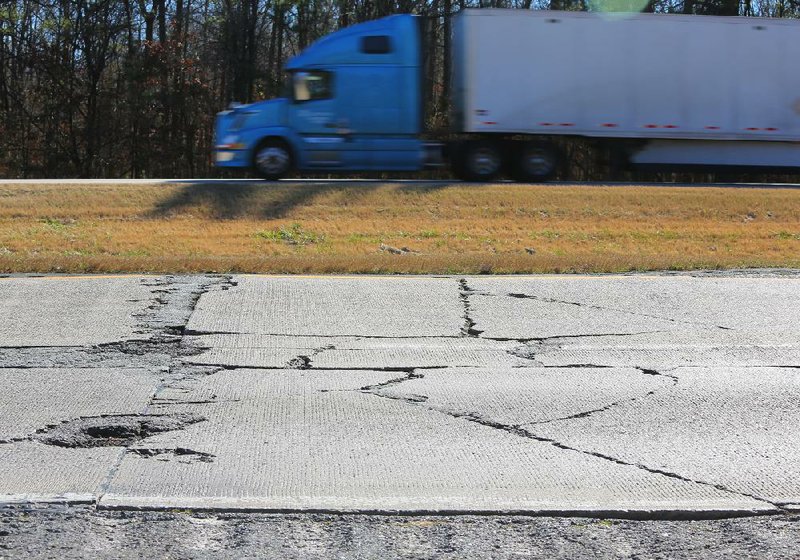A section of Interstate 30 that was long designed to fail is finally getting fixed.
For real.
The Arkansas Highway and Transportation Department on Tuesday reviewed an apparent low bid of $16.6 million on a project to reconstruct the pavement on a 2.9-mile section of the I-30 westbound lanes just west of the U.S. 70 exit in Saline County.
Until recently, the section has been part of the long-term pavement research program overseen by the Federal Highway Administration. It was one of more than 2,400 asphalt and concrete test sections throughout the United States and Canada set up for the large research project designed to investigate pavement-related details that federal highway officials say are critical to pavement performance.
That meant that when the state Highway Department would repair the section, it wasn't actually repaired.
The dozen 500-foot sections in that stretch of roadway were purposely designed and constructed below standards as part the testing program, which the federal government began in the late 1980s.
Modern pavement design calls for at least 1 foot of surface concrete on an interstate. The thicknesses of the test sections range from 8 inches to 11 inches. The bases on which the pavement sections rest also fall short of industry standards.
The sections were meant to break down. Because they weren't built to standards, the test surfaces disintegrated faster and, as a result, gave highway engineers markers to use when looking at sturdier road surfaces failing at a slower rate.
But federal highway officials say it is for a good cause.
The program was established to extend pavement life by investigating the various designs of pavement structures, using different materials under different loads, environments, soils and maintenance practices, said Nancy Singer, a spokesman for the Federal Highway Administration.
"The program is providing the data needed to understand how and why pavements perform as they do," she said.
But the section of I-30 between Malvern and Benton no longer will be part of the program.
Five construction companies submitted bids to improve the section. Koss Construction Co. of Topeka, Kan., was the apparent low bidder. Its bid was the second-highest in dollars, but when the number of days traffic would be affected was factored into the proposal -- 110 -- the firm's bid was the lowest by about $11,000.
"We are double-checking the bids," said Randy Ort, a department spokesman. "If there are any errors in the calculations, that will change things."
Koss' bid said it could do the work for $16.6 million. Road-user costs for the project were assigned a value of $177,000 per day, a figure arrived at by assigning values to the volume of traffic, the type of traffic and what it will cost road users for each day capacity is reduced, Ort said.
The bid amount coupled with the road-user costs over 110 working days, which is about one year, came to $36,072,205.04, which is the amount the department uses for award consideration.
The second-lowest bid was from was Weaver-Bailey Construction Inc. of El Paso, which had an amount used for award consideration of $36,083,296.68, or $11,091.64 more than the Koss bid.
The amount Weaver-Bailey bid was $10,418,296.68, but the company said it would need 145 days to do the work.
Interstate Highway Construction Inc. of Englewood, Colo., had an amount for award consideration of $36,795,103.31.
The project was one of 18 on which the department reviewed apparent low bids totaling $31,881,069.52. The projects, as well as the apparent low bidder and their bid amounts, included:
• Widening from two lanes to three about 1.3 miles of Arkansas 201 between U.S. 62 and Arkansas 5 in Mountain Home; Dilbeck Excavation of Mountain Home; $4,471,950.92.
• Installing rumble strips on shoulders of various highways in south Arkansas; Surface Preparation Technologies LLC of Mechanicsburg, Pa.; $3,441,766.12.
• Rehabilitating about 3.2 miles of U.S. 165 from U.S. 65 to Arkansas 208 in Chicot County; Johnsville Co. LLC of Hermitage; $1,509,813.75.
Metro on 01/28/2015
